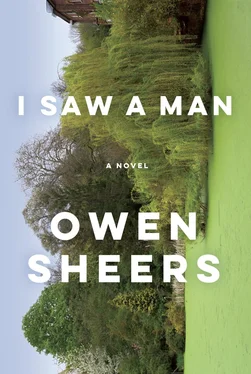“Not necessarily,” Michael said, picking up another print. It was of the same pond as before, at the same time of day. Only this time it was winter, the trees bare above the water. A low mist clung to the ground.
He offered her more wine. She declined, putting a hand over her glass, so he filled his own instead. “Is a story half cooked,” he asked her, “if it’s only been written but not read?”
“Absolutely!”
He laughed, thinking she was joking, but then saw that she wasn’t.
“Without the reader, it’s just thoughts on a page,” she said. “Imagination in ink. A printed tautology.”
“Tautology? How?”
“Well, a repetition then. Of what was in the writer’s mind when they wrote it. But when it’s read… ”
“Yes?”
“Well, then the words gather new imagery, don’t they? The meaning gathers new association. It’s like a chemical reaction. It all depends on how they react with the reader, their life, their mind.”
“Let me guess,” Michael said, narrowing his eyes in mock estimation. “Susan?”
Samantha laughed. “Yes, okay, but with some of me thrown in, too.”
Susan was a member of Samantha’s book club. When the group had learnt that Samantha knew Michael, they’d asked her to invite him to speak to them about BrotherHoods. The session had been far from an easy ride, but Susan, an ex — English professor, had been particularly dissective of his writing, and of what she’d called “creative nonfiction” as a whole.
“But she’s right, isn’t she?” Samantha said. “Surely you must have seen it with BrotherHoods ? How it becomes other books in other people?”
“Yes, but as a book in itself, it was done,” Michael replied. “Or at least done to the best of my ability. I’d probably change it now — actually, I’d certainly change it now, but at the time I finished it, it was finished. It wasn’t the book itself that was half cooked,” Michael said, warming to his theme. “So much as the experience.”
Samantha shook her head. “Now you’re just getting into semantics.”
“No, no, I’m not.” Michael put down his glass and picked up the top photograph, the pond beneath bare branches, the mist like cannon smoke. “All I’m saying is that these are far from half cooked. They’re quite the opposite. They’re bloody good, and they’d be that good, that true, whether people saw them or not.”
He handed the print to Samantha. “The communication was made when you took this, when you printed it. From then on it exists in the world, seen or not.”
He took another drink of his wine, looking for the right phrase.
“Its weight has been added,” he said eventually.
“Its weight?” Samantha looked doubtful, but she could tell Michael was being serious.
“Yes.” He picked up another print, the same pond, at the same time of day again, a swan and her cygnets drifting across the foreground. “Its telling has happened. That’s how I see it, anyway. The vision, your intention, your motivation, whatever you want to call it, is no longer purely internal. So regardless if I or anyone else looks at it, its story has still been told. Its purpose served.”
―
Samantha started taking photos of the pond shortly after Josh moved out. It had begun as a way to get to know the new camera she’d bought for her MA. She still wasn’t sleeping, so early one morning, a few hours after dawn, she’d set up a tripod next to the fence at the bottom of the garden. She stayed there for an hour, experimenting with exposures and timings as the Heath altered under the rising light. The next day she’d found herself awake at the same time. On coming into the kitchen, she’d noticed how different the Heath looked from the day before. It had rained overnight. The light, it seemed, had been washed, cleaned. The water of the pond, dark the previous morning, was metallic, polished. She took her camera to the fence again and, setting the tripod legs in the holes it had made the day before, began taking photos.
On the third morning, despite having fallen asleep in the small hours, she’d woken at the same time once more. She knew why. Those quiet, focused minutes. The slow reveal of the day, its light and weight, its texture and scent. Her body was expecting it, and her mind was asking for it. The exact same scene she’d stood before the previous mornings, but changed, altered. Never the same. Capturing it stirred in her a sense both of movement and of continuity. Of seeing afresh. How many times had she looked out her back door and seen that view? But never, not one of those times, as she’d seen it on those mornings, a unique recipe of light, weather, and season, framed in the lens of her camera.
Samantha’s morning sessions became the foundation of what had now become her weekly routine. Every morning, regardless of the weather, and more often because of it, she could be seen out there, next to the willow, bending to her viewfinder. On three of those mornings, after taking her pond photographs and walking Rachel to school, she went to work as a PA for a film director in Hampstead village. The work wasn’t taxing — organising his expenses, replying to emails, ordering prints and booking lunch meetings, screenings. But it was new to her, and sociable. While he worked in his office at the top of the house, Samantha worked on the kitchen table, making her party to the movements of the day. Not just the editors and writers who came to meet him, but also the comings and goings of his wife and two sons. It was a workplace, but also a family home. Martha, her sister, had feared it might make Samantha grieve for her own. But the variety and rhythms of the house invigorated her, inspired her even, reminding her of what she’d once wanted and of how much of it had somehow drifted from her over the years of her marriage.
On the other two days of the week she studied at the Royal College, going to lectures and seminars, spending hours in the computer and printing rooms. Again, despite her being ten years older than most of the students, the environment excited her. But it frustrated her, too. She was impatient to learn, to improve. She felt as if she had years to catch up on, a lost decade. Whereas the other students behaved as if time was an inexhaustible luxury, Samantha, knowing it to be a rare reserve, harried at her course and her tutors.
Over those first months after Josh moved out, Samantha gradually came to realise that just as she had autonomy over the hours of her days, so she could choose how to spend her evenings and nights. There was no mortgage on the house, and although Josh no longer had a job, he was still able to pay regular contributions for Rachel and the housekeeping. Whatever Samantha earned from the PA work was hers to spend how she wished. For so many years she’d allowed her socialising to be dictated by Josh’s work, by his colleagues and their wives. There were few of them she’d liked on her own terms, so when after a few months she’d begun to contact friends again, to email them about cinema showings or phone someone for a drink, it was nearly always a case of reconnecting with a friend from years ago, rather than anyone, except for Michael, whom she’d seen regularly before Lucy’s death.
In this way, between her hours at the director’s house, her studies, caring for Rachel and a few old friends, Samantha occupied herself. But none of it did anything to appease her grieving for Lucy. Her daughter had been just four years old. But Samantha had known her for longer than that. Ever since her body had begun forming within hers, ever since the tides of its growing had driven her cravings, her sleep patterns, and mood swings. And yet, at the same time, she’d only recently felt as if she were becoming acquainted with who Lucy actually was, and with who she might become. In the last few months before her death, when Samantha watched her playing with Michael, or on her own, engrossed in a conversation with her dolls, she thought she’d begun to see the hints of the girl beyond the child. And then, within those hints, like a receding line of mirrors within mirrors, the teenager beyond the girl, the woman beyond the teenager and even, in certain fleeting expressions, the elderly woman beyond the adult.
Читать дальше











